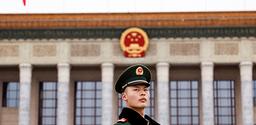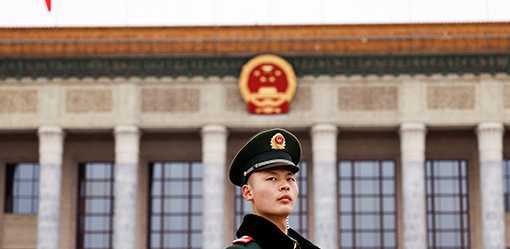

By Yew Lun Tian
BEIJING (Reuters) -China's parliament, the National People's Congress (NPC), will kick off its annual session on Tuesday, with all eyes on plans to support growth in the world's second largest economy.
A property crisis, deepening deflation, a stock market rout, and mounting local government debt woes have pressured China's leaders, so that the stakes for this year's session loom large for international investors and companies operating there.
Here are key details and issues to look out for:
WHAT ARE THE "TWO SESSIONS"?
Parliamentarians and political advisers gather in Beijing every March for two parallel sets of meetings called the Lianghui or "Two Sessions".
Fanfare surrounds the week-long meetings in the Great Hall of the People, a cavernous building south of the Forbidden Palace, which state media publicises widely to send a message that policy and personnel decisions made there express the will of the people.
The NPC, consisting of elected parliamentarians, is China's national legislature and in principle the most powerful state body under the constitution.
The Chinese People's Political Consultative Conference (CPPCC) is a top advisory body of experts, business leaders and representatives from other political parties.
In practice, both the NPC and CPPCC answer to the Chinese Communist Party led by supreme leader President Xi Jinping.
No bill or personnel decision proposed by the party has ever been rejected by the parliament, which is why it is widely characterised as a "rubber-stamp" body.
WHAT ARE THE HIGHLIGHTS?
When the NPC opens, Li Qiang, who was named premier at last year's session, will deliver his first government "work report", an annual speech of policy priorities that has been compared to the U.S. president's State of the Union address.
In past years, the speech has set economic targets and outlined plans to reach these goals.
A major highlight since 1993 has been the premier's meet-the-press session on the last day of the meetings. But the press conference has been scrapped this year and for the rest of the parliamentary term, a parliament spokesman said on Monday.
As parliamentarians have the power to appoint senior government officials, some diplomats expect that Liu Jianchao, now the de facto foreign minister for the Communist Party, could be named China's foreign minister at this year's meetings.
WHAT ANNOUNCEMENTS TO LOOK OUT FOR?
Li's work report will review the past year before outlining key economic objectives, expected to include steady growth for 2024 at about 5%, and a budget deficit of 3% of gross domestic product.
Analysts expect him to unveil moderate stimulus plans to stabilise growth but stop short of bold reforms to fix deep structural imbalances.
Li may also elaborate more on how the state wants to leverage "new productive forces", a concept first raised by Xi last September describing steps to promote strategic industries including artificial intelligence.
China will also announce its defence budget, which has grown at a faster pace than GDP since Xi came to power 11 years ago.
Analysts say continuation of the trend, despite a purge last year of several generals in charge of military procurement, would underscore the emphasis Xi, as commander-in-chief, puts on national security amid strategic competition with the United States.
Other state bodies will also lay out plans for the year ahead in work reports. For example, the parliament might outline what laws it aims to pass in 2024.
WHO WILL BE THERE?
About 2,960 parliamentarians from all over China, including Hong Kong, will meet.
There are also 13 delegates selected by China to represent Taiwan, which Beijing regards as its territory. Democratically-governed Taiwan rejects that claim, in a source of continuing tension.
Most will come wearing dark suits, while others don colourful ethnic costumes. Many will be in military uniform, reflecting a sizable contingent from the People's Liberation Army.
Also in attendance are 2,200 political advisers.
Delegates will discuss the policy objectives figuring in work reports and suggest tweaks. Parliamentarians give their stamp of approval by voting on the last day of the meetings. Political advisers have no right to vote.
(Reporting by Yew Lun Tian; Editing by Clarence Fernandez)




